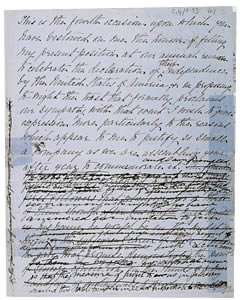|
Andrew Inglis Clark's speech
commemorating the July 4th centenary of the United States. (Probably
late 1870s)

Click
to enlarge
|
This is the fourth occasion on which
you have bestowed on me the honour of filling my present position
at our annual reunion to celebrate the declaration of their
independence by the United States of America, and in proposing
this toast that formally proclaims our sympathy with that
event I wish to give expression more particularly to the reasons
which appear to me to justify so small a company as we are
assembling year after year to commemorate it.
And I am prompted to do so by the fact that there are those
who oppose our sympathy [some lines indecipherable]. My reply
to that answer is that the measure of profit to us in gathering
round this table tonight is in exact proportion to the depth
and sincerity of the convictions and opinions which by our
presence we profess and cherish, But the strongest convictions
and the most fervent enthusiasm of the individual requires
a response in the minds and hearts of others in order to impart
to their possessors the confidence necessary to reduce them
to action. In this fact we find the rationale of all associations
and organisations of men directed to the control of human
conduct; and every gathering of individuals in the name of
a common belief influences the subsequent acts of those who
take part in it in accordance with the measure of the sincerity
of their professions.
We have met tonight in the name of the principles
which were proclaimed by the founders of the Anglo-American
Republic as those which justified resistance to a government
which had violated them and a permanent repudiation of its
authority; and we do so because we believe those principles
to be permanently applicable to the politics of the world,
and the practical application of them, in the creation and
modification of the institutions which constitute the organs
of our social life, to be the only safeguard against political
retrogression. Unhappily, gentlemen, history teaches us that
although perpetual progress is the law of humanity retrogression
in special cases is possible; and it is the possibility of
political retrogression in consequence of a forgetfulness
and violation of the principles we have met to magnify which
justifies us in assembling annually to remind one another
of the worth of what we inherit from the struggles and victories
of the forefathers of our kinsmen on the American continent.
And the fewer we are the more earnest and punctilious we ought
to be in keeping live in each others hearts the sentiments
which bring us together at the present moment so, that we
may be preserved against the insidious contamination of the
indifference and lethargy of the majority around us. This,
gentlemen, is the utility of our annual gathering on the anniversary
of the day which we commemorate tonight; and I have confined
myself on this occasion to a vindication of our action in
so doing in order to encourage the fullest expression of sentiment
in those of you who shall speak after me, and trusting that
the result which I have aimed at will be secured, I give you…
Clark Papers, C4/F33 (a)
|
Speech by Clark honouring George Higinbotham
Draft of an 1893 speech by Clark. The subject,
George Higinbotham, was puisne Judge in the Victorian Supreme Court
from 1880, and Chief Justice from 1886. Higingotham had died on
31 December 1892. Before that, he had been active in Voctorian politics
as a radical democrat, and vehement proponent of separation between
politics and religion. Clark's consistent reference to 'Australasian
colonies' reflects the fact that in the early 1890s inclusion of
New Zealand in the envisaged federation was regarded as possible.
The 1891 letter from Higinbotham to Clark, referred to in the fourth
paragraph, in which Higinbotham discusses the envisaged federal
constitution, is in the Clark Papers at C4/C206. The style is prolix,
even for Clark. On Higinbotham, see the article by G M Dow in the
Australian Dictionary of Biography, vol. 4.
(R. Ely)
The noblest inheritance which any nation
can possess, and the most powerful stimulus to all that
we include under the broad name of patriotism, are the heroic
tradition and the illustrious memories of the great and
good men whose deeds and words are integral portions of
that nation's history. We know that it has been said that
the happiest nations are those that have no history. But
if the absence of history means the absence of all inspiring
records of human excellence, we cannot have any hesitation
in deciding that the conflict of good and evil, which evolves
out of the potentialities of human nature [and] produces
the saints and heroes of humanity, is to be preferred to
any state of political and social stagnation which leaves
no record of any change in its monotonous quiescence.
We have not yet witnessed in Australasia
any of those momentous struggles for a better and juster
organisation of society which fill so large a place in the
annals of the older nations of the world, and with which
the names of so many faithful combatants and martyrs for
human welfare are inseparably associated, but we have had
conflicts of antagonistic forces for the possession of society
sufficient to supply a touchstone of human character, and
to teach us that the opportunities of virtue and heroism
are not limited to any age in the history of the world or
to any soil or climate.
The result in each of the Australasian
colonies has been to reveal to us the noble qualities possessed
by many of the men who have done good service in building
up the institutions under which we live and whose names
and deeds we desire to be recorded for the instruction of
the future generations who shall inherit the benefits of
their labours. But among them all the name of the late Chief
Justice of Victoria occupies a unique and pre-eminent position
in the affections of the people of Australia, and I have
placed upon our notice paper for today the motion to which
I am now asking the House to agree, because I believe that,
at the present juncture in the history of the Australasian
colonies, their several parliaments could not perform any
act that would be a more appropriate or significant expression
of that unity of sentiment and sympathy which must contribute
the ultimate and permanent basis of any political and organic
Union of the future, than the adoption of [a]motion in which
the example of a noble life, limited in its local activities
to one colony only, is recognised as a possession of all
of them.
It is not my intention to make any attempt
to sketch in words the public career of the man whose name
I invite the House to inscribe on its records, bur I shall
crave the indulgence of the House for a few minutes to say
that I recall the few occasions on which I heard him speak
in the law courts and in the Victorian Parliament as among
the most inspiring recollections of my life. I believe that
it will be admitted by all competent judges that as an orator
he stood without peer throughout the whole of Australasia,
and I think I may safely say that during the last five or
six years of his parliamentary career I eagerly perused
every important speech he made. In after years when he had
quitted the stormy theatre of politics for the calmer atmosphere
of the bench it was my valued privilege to have several
personal interviews with him, and during the sittings of
the federal convention in Sydney I received a long and thoughtful
private communication from him in reference to an important
feature in the proposed federal constitution. He watched
the sittings of that convention with great interest and
he was deeply desirous of seeing the federation of Australasia
accomplished. He has not lived to see that event, and to
fill a place in the federal commonwealth which would have
directly and officially associated his name with its establishment
and its earlier career.
But whatever wider opportunities for fame
a federated Australasia may afford for its most gifted children
in the future, I feel I am not guilty of any exaggeration
when I say that it will be impossible for any of them to
enrich its history with a more stainless record than that
which George Higinbotham has bequeathed to us, or one from
which subsequent generations will be able to draw a higher
inspiration for the performance of the tasks allotted to
them. The motion before the House speaks of the loss which
the people of Australasia have sustained by his death, but
in this instance as in every other like it, death and the
grave are unable to take from us the most precious element
of the life that has terminated.
Astronomers have told us that if
one of the most distant and most brilliant planets that
illuminate the sky should be suddenly darkened, the light
it had been emitting for preceding centuries would continue
for additional centuries to pour beams upon the world. So
when a great and good man dies the light and influence he
leaves behind him continue to shine down the ages to guide
and inspire men of subsequent generations to follow in his
footsteps, and we shall surely do well if in placing this
motion upon our records we assist in directing the attention
of those who come after us towards a life so radiant with
light and fidelity to conviction and the suppression of
all selfish aims in the discharge of public trust.
(Clark Papers C4/F32)
[Punctuation slightly varied]
|
|

